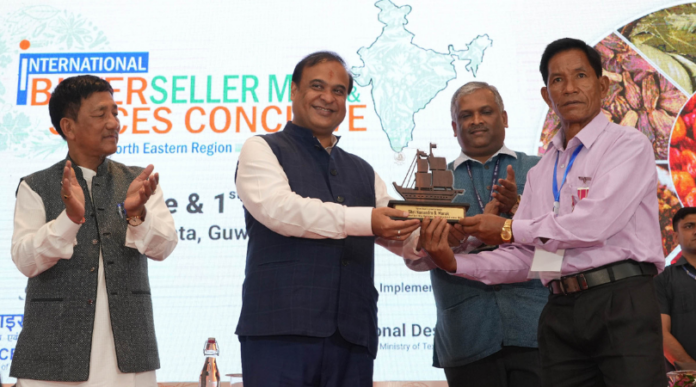GUWAHATI:
The Northeastern region can emerge as the major supplier of organic foods to the globe, Assam chief minister Himanta Biswa Sarma said on June 30.
“The northeastern region has acquired special attention in the global map owing to the quality of spices that are considered organic and amongst the many unique products and features for which the region is famous for, spices are of special recognition having global demand,” Sarma said addressing the International Buyer Seller Meet and Spices Conclave organized by the Spices Board of India for the Northeastern region at a city hotel in Guwahati.
Sarma said that being the gateway of the Northeast, with better connectivity and fast-developing infrastructural facilities; the state has the potential to be a major hub for post-harvest processing and value addition of spices from the region and can become one of the major exporting hubs.
Sarma informed that Assam produces nearly 3.1 lakh metric tonnes of spices annually. The state holds a major share in the production of spices such as ginger, turmeric, coriander, mustard, chilli, garlic, etc.
The chief minister said that steps have been taken to make the best use of Prime Minister’s Developmental Initiative for Northeast (PM-DevlNE), One District One Product (ODOP) scheme and to convert the ‘by-default organic’ tag of the spices produced in the region to ‘certified organic’ or ‘organic by design’ to realize the maximum potential of spices sector.
The chief minister informed that under the ODOP scheme, several districts in Assam have identified spices as their focus crop, such as; turmeric from Bongaigaon; mustard seeds and mustard products from Darrang, Dhemaji, Dibrugarh and Majuli; ginger from Karbi Anglong, West Karbi-Anglong, and Dima Hasao and Chilli from Dhubri and Jorhat.
Lauding the Spices Board for its initiative to start a Quality Evaluation Laboratory for Spices in Guwahati, the chief minister said that the laboratory will be of immense help and benefit to the northeastern region as this will make available state-of-the-art testing facilities for spices that are at par with the international standards, in the region itself.
Saying that due to lack of adequate infrastructure & industry presence for processing and value addition of spices, presently most of the produce goes out on raw or semi-processed stage resulting in low income to the farmer and producer, Dr. Sarma stressed proper coordination between Spices Board, Farmer Producer Organizations and Agriculture as well as Industry Department.
Stating that India has been known globally for its homegrown spices, Sarma said that spices and herbs in the country play roles that go way beyond just cooking, and they are regularly used for their curative and therapeutic properties.
He mentioned that India produces about 75 of the 109 varieties of spices listed by the International Organization for Standardization. The country has emerged as the world’s largest producer, consumer and exporter of spices and overall production of different types of spices has been growing rapidly over the last few years, he remarked.
In his address, Arunachal Pradesh agriculture minister Tage Taki stressed on the need for adequate technology and institutional support to further develop the spice sector of the northeastern region.
In his welcome address, Spices Board secretary D Sathiyan said International Buyer Seller Meet and Spices Conclave’ is envisaged to promote the indigenous spices of the eight northeastern states, especially the GI-tagged varieties of Sikkim large aardamom, Karbi Anglong ginger, Naga Mircha, Bird’s Eye Chilli (Mizo Chilli), Hathei Chilly and Dalle Khursani”.
The conclave was participated by leading foreign buyers, major exporters, farmers, and traders from across the northeast. The event was organized in line with the vision of Prime Minister Narendra Modi to promote India’s rich heritage of traditional spices, herbs and medicinal plants across the globe as well as to facilitate growth and development of Spices, Condiments and similar products from the Region.
The event conclave will conclude on July 1.


